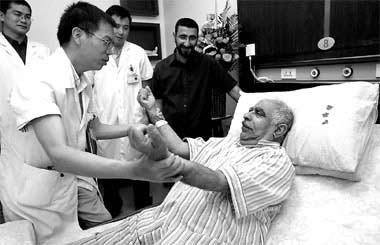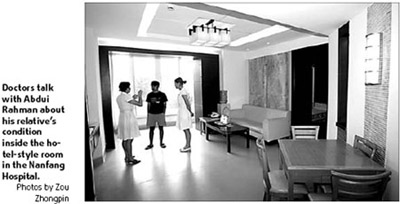Yaqob Qallas left the Nanfang Hospital last week after recovering from a stroke. The 72-year-old Kuwaiti suffered symptoms a few months ago and although he received Western-style medical treatment in his home country, he was not recovering.
Doctors with the Nanfang Hospital in Guangzhou help Yaqob Qallas from Kuwait recover from a stroke.
"Through friends, we heard about traditional Chinese medicine (TCM), and also learned that Guangzhou's foreign medical facilities are quite advanced," Sabi Qallas, Yaqob's son, tells China Daily. "We then decided to send our father to the hospital."
In Guangzhou, Yaqob Qallas received acupuncture and high-pressure oxygen treatment. Chinese doctors assisted the elderly man in his rehabilitation training to prevent paralysis. He also took TCM medicine every day. "The service of the hospital is very impressive," Sabi says.
The family paid about 40,000 yuan (US$5,200) for treatment. Sabi did not consider this expensive. In fact, it is much cheaper than their expectations, and the hospital's facilities and services were better than those in some developed countries, he says.
The Nanfang Hospital set up its foreign-related medical organization in the Huiqiao Building in 1979. To cope with the increasing number of patients, another two buildings were built in 1984 and 1989. The hospital even hires agents in Kuwait to attract patients to Guangzhou every year.
"It is the top foreign-related medical organization in China, having received more than 90,000 patients from 83 different countries or regions," Wu Manping, deputy director of Huiqiao Building, told China Daily.
Occupancy rates at the Huiqiao Building are 90 percent all-year round, Wu says. But he points out that similar medical organizations have appeared over the past decade, creating more competition.
"Almost all large hospitals in Guangzhou, which are usually called 'Triple A' hospitals, have set up VIP patient rooms or special buildings focusing on foreign patients," Wu says.
There are about 30 Triple A hospitals in Guangzhou. Besides Nanfang Hospital, the other influential hospitals, which have foreign-related medical organizations, include the Guangzhou Tumor Hospital, the Guangdong Provincial People's Hospital, and the First Affiliated Hospital of Guangzhou Medical College.
"There is no independent hospital which treats only foreigners in Guangzhou so far," says Huang Sui, an officer of Guangzhou Municipal Health Department. "However, a lot of large hospitals have rooms for overseas patients, which are more expensive than common rooms."
Not all patients who take such rooms are foreigners, Huang says. Some come from Hong Kong, Macao and Taiwan and also from the Chinese mainland.
According to the Price Control Administration of Guangzhou, foreign-related medical organizations are allowed to charge an additional 30 percent above normal prices.
"Patients pay more, but we work more," says Zhu Bili, head nurse of Huiqiao Building. "We must keep smiling and give good service to patients, but we also have more trivial things to handle."
Because patients come from different countries, they naturally have different habits and customs. Many of the Middle Eastern patients are Muslims and the hospital makes sure the appropriate food is served.
Some patients prefer to take a nap after lunch and nurses cannot enter their rooms and disturb their sleep, Zhu says. "We are not allowed to speak loudly to them, or we will get complaints," she says.
The interior designs of foreign-related medical organizations usually resemble hotels. They have lobbies, front desks, cafeterias and hair salons. The patient rooms are double rooms or single rooms.
According to Huang Sui, most doctors in Guangzhou can speak English and medical English tests are regularly held to test doctors' linguistic levels.
However, foreign-focused medical services require more than just English-speaking doctors. These people must be experts in their field. Nurses also must communicate in basic English, Wu Manping says.
Moreover, the organizations hire medical guides, who are not doctors or nurses, but work as translators.
"Patients spend 24 hours in the hospital each day, and they need the guides to help them when they need food or other services," Wu says.
So far, the central government has not issued any formal limit or directed specific guidance to foreign-related medical organizations. This means hospitals can set up their affiliated foreign-related organizations freely as long as their have the funds and relevant facilities.
However Zheng Jun, a director of Guangzhou Foreign Affairs Office, says his office is working with the municipal government and plans to conducts a city-wide check of foreign-related organizations soon, covering schools and hospitals.
The market for foreign-related medical service is huge. According to the Public Security Department of Guangdong Province, more than 3 million foreigners entered Guangdong last year and about 50,000 foreigners lived in Guangdong for more than half a year.
Some hospitals are also expanding their businesses in foreign countries.
According to Li Wenyuan, about 80 percent of the patients who visited doctors in Guangzhou learned of the city's foreign-related organizations from friends or other channels in their home countries and then came to Guangzhou specifically for medical treatment.
Only 10 percent actually lived in Guangzhou.
(China Daily August 14, 2007)



